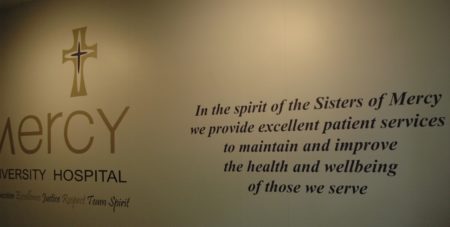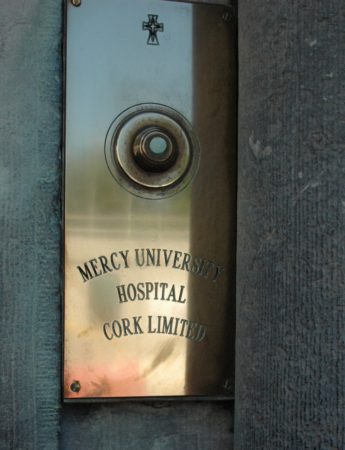“The Sisters of Mercy beg to inform the charitable Public that they have opened a Hospital for the Relief of the Sick Poor of the City. The want of such an Institution is universally acknowledged, while the benefit it is likely to be to society must be obvious to every reflecting mind”

On March 16th, 1857 the Cork Examiner (now the Irish Examiner) announced the opening of the Mercy Hospital, the first in Ireland. The hospital would open its doors on March 17th under the stewardship of four Sisters of Mercy – Mother de Pazzi Barry, Sr. de Sales Lane, Sr. Rose Doherty and Sr. Agnes Wall – admitting eight patients on that first day. The courage and tenacity of these four women, stepping into the unknown and responding to the need of their time set the standard for everything that Mercy would achieve across the subsequent 16 decades.
Reaching this milestone anniversary of 165 years affords the hospital the time and opportunity to reflect on its legacy and recommit to the charism, mission and values inherent in being Mercy. It is a time to honour those who have brought us to this place. It is a time to be inspired by the rich legacy that has been handed on to us and it is a time to re-affirm what Mercy means each day through our encounters with our patients, our community and each other. Sr. Maria McGuiness, who worked with the staff of the hospital, over ten years ago, to determine its Core Values, often quoted Oliver Holmes who noted that “the great thing in this world is not so much where we are but in what direction we are moving.”

The “direction we are moving” is underpinned by our mission which continues to build on the strong foundation of our Mercy culture enabled by our core set of values that ground and shape all our actions, decisions, and behaviours. The spirit of Mercy has been handed on to each generation. This spirit of Mercy is an expression of the way all those who work in Mercy choose to live its identity, tradition, mission and values through every aspect of our hospital life – patient care, pastoral care, staff wellbeing, policy implementation, compliance and regulation, development etc. Thus, we live out our mission by translating the Mercy values into actions, making respect, justice, compassion, excellence and team spirit the traits for which Mercy is known. The charism of Mercy is evident through continued bias for action, hospitality, a pioneering spirit, being in right relationships and embracing a fullness for life. Thus, understanding and living our Values creates an environment of cultural excellence within our hospital which ultimately enhances better patient care and outcomes.
The appointment of a dedicated Values & Culture Lead in 2018 to develop, support and promote the roll out of the MUH Mission and Values Programme has enabled the expansion and continual refinement of educational programmes underpinned by the MUH Values, which engage staff in the Mercy story, the importance of legacy and ongoing stewardship of the Mercy ethos. Passive formative experiences are enabled by the representation of the Values across spaces, places and experiences within the hospital which connect staff to their common purpose and ensure patients know that they are being cared for in Mercy. Equally, celebrations and ceremonies that give expression to the spirit of Mercy nurtures the community spirit that is central to the essence of Mercy.
“The Mercy” as it is so warmly referred to is part of the fabric of Cork City as it has been the hospital of choice for generations of families. The affection and esteem in which Mercy University Hospital is held is testament to the relationships which the Sisters nurtured from the outset of their mission. That is why, more than ever, it is critical that the mission and values of Mercy University Hospital are not simply words on paper or deemed as relics of the past. Whilst they may be informed by history, they are very much alive today taking root in our being and ensuring that we “Make Mercy Real” every day. Fundamental to this is a consciousness of the importance of protecting the basic rights of all individuals. Mercy University Hospital continues the commitment it made 165 years ago in promoting equity of care and having particular concern for those in our society who are vulnerable and marginalised. Two portraits hang on the walls of the Mansion House – Catherine McAuley and Josephine Ward – the presence of both women remind us of their commitment to reach out with practical compassion to the needs of the poor and how they moved into places of heart-rending unmet need both near and afar with absolute trust in providence.

On April 10th, 1857, the Cork Examiner reviewed the new Hospital and noted, “nor need the poor patient who lies in one of the beds of the Mercy Hospital have any apprehension of leaving in his home a destitute family; for the same charity which provides this relief will also ward off hunger and despair from the home deprived for a time of its most valuable member. The society of St. Vincent de Paul will act in harmonious concert with the Nuns of the Mercy Hospital”. Today, Mercy University Hospital still continues to act in “harmonious concert” with agencies across the City of Cork to fulfil the vision of Catherine McAuley and hold true to her statement that “The poor need help today not next week”.
Throughout this coming year we will honour this landmark anniversary under the banner “It Started with Four”, taking the time to honour our Mercy traditions. From its humble 40-bed beginnings in the Mansion House, this first Mercy Hospital has developed into a modern 338 bed acute hospital

providing excellent care for all who seek its services. In its 165 years of service, Mercy University Hospital has never closed its doors. This is a great tribute to the multitude of caregivers who so generously invested their time and talents over the years to promote purposeful progress while never losing sight of the people it served. Let us endeavour to continue in the footsteps of those who have set the standard, let us continue to bravely step into the unknown and to keep moving whilst aware of and responding to the needs of our time.
Author:
Siobhán Kenny
Values and Culture Lead, Mercy University Hospital, Cork
Archival Material from Cork Examiner supplied by:
Dora Lynch rsm
Archives Co-Ordinator
Southern Province


